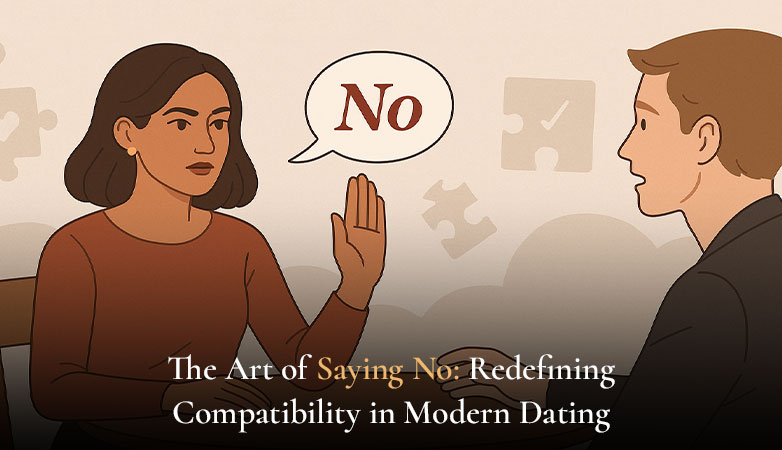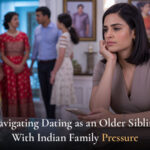Introduction: The Power Of Boundaries In Relationships
Modern dating is noisy. Between swipes, texts, and well-meaning friends saying “just give it a shot,” it’s easy to forget that no is a complete sentence.
But here’s the truth: one of the clearest signs of compatibility in a relationship isn’t how often you say yes, it’s how comfortably you can say no.
When two people can draw healthy lines, express discomfort, or admit misalignment without drama or shame, that’s compatibility in its most grounded form.
And no, we’re not just talking about “not liking the same music.” Real compatibility today is shaped by:
- Emotional intelligence in dating
- Clear, respectful communication
- And the big one: healthy relationship boundaries
True compatibility allows for personal growth through dating, not codependence.
Because if they can’t handle your boundaries now, how will they handle your truths later?
Understanding Compatibility Beyond Shared Interests
Let’s be honest: compatibility isn’t about liking the same cuisine or watching the same Netflix shows anymore.
Modern compatibility is deeper. It’s about emotional rhythm, boundary awareness, and how two people navigate discomfort, not just share joy.
According to a 2020 study in Personality and Individual Differences, it’s emotional regulation and relationship communication skills, not surface-level similarities, that actually predict long-term connection.
So what does real compatibility look like today?
- Value alignment: How do you make decisions? Do you both believe in autonomy, or shared routines? Do you handle conflict with curiosity or shutdowns?
- Emotional availability: Can you both show up with honesty and openness, especially when things get uncomfortable?
- Boundary fluency: Are personal limits respected? Do you know how to assert yours, and can they hear a no without taking it personally?
Here’s the truth: one of the quietest signs of compatibility in a relationship is this, how your “no” lands. And how you handle theirs.
Because love that lasts isn’t just built on green lights. It’s built on how you handle red ones.
The Role of Saying ‘No’ in Establishing Healthy Boundaries
Here’s a dating reframe we all need:
Saying “no” isn’t rejection. It’s self-respect.
It’s also one of the strongest foundations of healthy relationship boundaries. When you say no, you’re not pushing someone away, you’re choosing to stay aligned with yourself.
According to Harvard Health, setting boundaries actively reduces emotional stress and improves long-term relationship satisfaction. Translation? You’re doing both of you a favor.
Some healthy ways to say no (and mean it):
- “I’d like to slow things down”: Because you’re not ready to rush exclusivity
- “I’m not feeling a deeper connection”: And that’s okay, chemistry can’t be forced
- “I need to log off this convo tonight”: Because your bandwidth matters too
Saying no isn’t an ending—it’s the beginning of personal growth through dating with integrity.
So the next time your gut says “not this,” trust it. Your no can be a turning point, not an ending.
Empathy and Communication: Key Components of Respectful Rejection
Nobody enjoys rejection, not giving it, not receiving it. But when it’s handled with care, it doesn’t have to feel like a door slamming shut.
Even the most subtle signs of compatibility in a relationship often emerge in how gently we handle rejection.
Respectful rejection techniques that don’t sting:
- Start soft: “I’ve really appreciated our time together, and I’ve given this thought…”
- Affirm them: “You’re genuinely thoughtful, and I see your sincerity…”
- Be clear and kind: “But I don’t feel this is the kind of compatibility I’m looking for”
This style of communication threads together mental health and dating, mutual respect, and relationship communication skills.
It’s not about making someone feel small, it’s about honoring the connection enough to end it honestly.
The Impact of Saying ‘No’ on Mental and Emotional Health
Let’s be honest, saying no in dating can feel… risky.
What if they think you’re too much? Too picky? Too cold?
But here’s what most people don’t realize: a well-placed no protects your energy, your time, and most importantly, your peace of mind.
Science says it’s worth it:
A 2015 study from the University of California revealed that people who consistently assert healthy relationship boundaries experience higher self-esteem, stronger emotional resilience, and more fulfilling partnerships.
And it makes sense. When you say no to what doesn’t serve you, you make room for the things that actually do.
In the context of mental health and dating, this becomes crucial. Constant yes-ing to avoid conflict? It leads straight to:
- Burnout from emotional overextension
- Decision fatigue from constant second-guessing
- Resentment (yep, even when it starts as love)
Real compatibility isn’t built on tolerance. It’s built on honesty.
So think of every no as an act of self-care in dating. Not a rejection. Not a rebellion. Just a recalibration, to protect your well-being and deepen your emotional alignment.
Practical Strategies for Saying ‘No’ Without Guilt
Feel guilty every time you set a boundary? You’re not alone.
So many of us were raised to avoid being “difficult” in romantic settings. But guilt shouldn’t be the cost of your emotional safety.
Here’s how to assert healthy relationship boundaries with clarity, compassion, and no regret.
Know your non-negotiables:
Figure out what’s a hard no for you, emotionally, physically, and even logistically.
This is the foundation of understanding the non-negotiables in relationships.
Use “I” statements to stay grounded:
Instead of blaming or deflecting, say:
“I’m not comfortable with that pace” or
“I need more emotional consistency to feel safe.”
This is assertiveness in romantic relationships, without defensiveness.
Practice with low-stakes conversations:
Not every “no” has to start with a breakup. Try it with friends or family first to build confidence and ease.
Buy time when you’re unsure:
Feel cornered in the moment? Try: “Can I get back to you tomorrow?”
This gives you space to check in with your emotional intelligence in dating decisions.
These tools aren’t just about learning to reject, they’re about learning to choose.
Choose what aligns. Choose what supports your growth.
Choose the signs of compatibility in a relationship that make you feel seen, not just safe.
Conclusion: Saying No Is Its Own Love Language
In today’s dating world, it’s not about collecting matches, it’s about recognizing misalignment and having the self-worth to walk away anyway.
And that, right there, is one of the clearest signs of compatibility in a relationship: the ability to say “no” with confidence, empathy, and intention.
Because compatibility isn’t just about shared playlists or weekend plans. It’s about:
- Emotional intelligence in dating
- Healthy relationship boundaries
- The courage to have tough conversations
- And the grace to let go when it doesn’t feel right
When you say no, whether to a second date, a situationship, or a mismatch of values, you’re actually saying yes to yourself. That’s not rejection. That’s radical self-care in dating.
If you’ve been people-pleasing your way through romance, ignoring your non-negotiables, or quietly burning out emotionally… It’s time to reset.
At Sirf Coffee, we help you date with clarity, not confusion. With expert matchmakers and curated connections rooted in shared values, you’ll never have to say yes just to keep the peace.
Ready to date on your own terms? Start your journey here.
FAQs: The Boundaries Edition
Why is saying ‘no’ important in modern dating?
Because “no” protects your peace. It’s a key part of mental health and dating, allowing you to stay authentic, clear, and connected to your emotional truth.
How can setting boundaries improve relationship compatibility?
Clear boundaries help highlight your non-negotiables in relationships. When those are respected, both partners feel seen, leading to stronger relationship communication skills and deeper alignment.
What are some effective ways to say ‘no’ without causing offense?
Use empathy. “I really enjoyed getting to know you, but I don’t feel the right connection between us.” That’s a classic respectful rejection technique: honest, kind, and clear.
How does saying ‘no’ contribute to emotional well-being in relationships?
It supports your emotional boundaries, reduces resentment, and invites only those connections that support your growth. This is how you experience real personal growth through dating.


